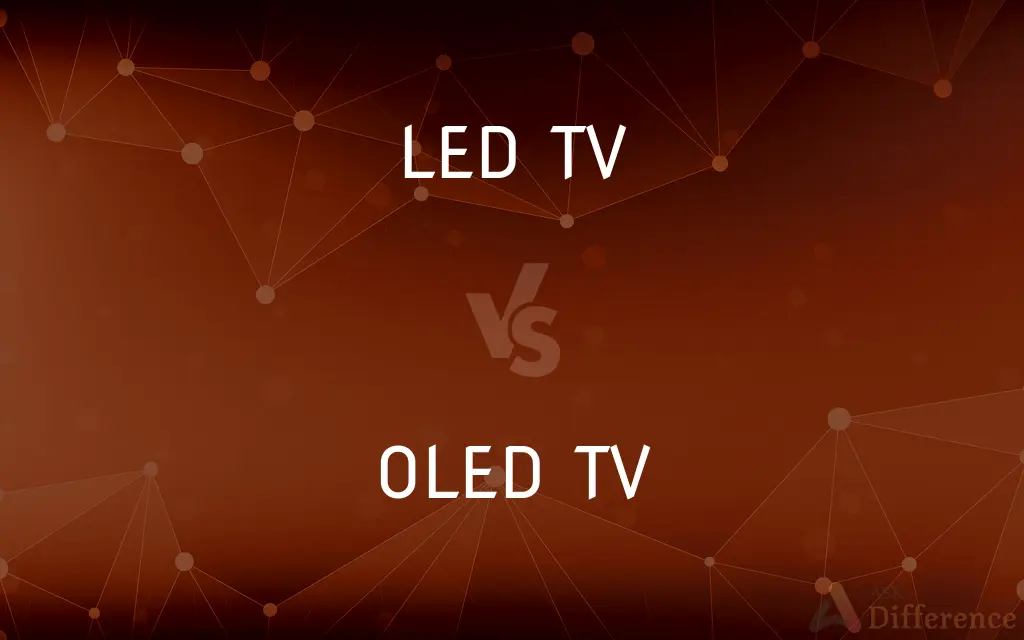LED TV vs. OLED TV — What's the Difference?
Edited by Tayyaba Rehman — By Fiza Rafique — Published on November 1, 2023
LED TV uses a backlight to illuminate its pixels, while OLED TV has pixels that emit their own light. This results in OLED TVs having true blacks and better contrast. Both offer sharp displays, but with differing brightness and color depth.

Difference Between LED TV and OLED TV
Table of Contents
ADVERTISEMENT
Key Differences
LED TV, which stands for Light Emitting Diode Television, uses LEDs to backlight its display. These LEDs can be either placed behind the screen or along the edges. OLED TV, which stands for Organic Light Emitting Diode Television, has a display composed of organic pixels that produce their own light when an electric current is applied.
LED TV displays are typically brighter than OLED TV displays because of the powerful LED backlights they use. This makes them more suitable for well-lit rooms. OLED TV, on the other hand, can achieve true black levels since individual pixels can be turned off completely, resulting in superior contrast ratios.
In terms of color accuracy and vibrancy, OLED TV often outshines LED TV. Because OLED TV pixels emit their own light, they can produce more accurate colors. LED TV, while capable of displaying vibrant colors, may not achieve the same depth and range as OLED TVs.
Another notable difference between LED TV and OLED TV is their viewing angles. OLED TVs tend to have better viewing angles, maintaining color accuracy and clarity from off-angles. LED TVs, especially those with cheaper panels, might suffer from color washout or reduced clarity when viewed from the side.
Lastly, in terms of lifespan, LED TVs generally have a longer lifespan than OLED TVs. OLED TV, being organic, can suffer from "burn-in" if static images are displayed for extended periods. LED TV does not have this issue to the same extent.
ADVERTISEMENT
Comparison Chart
Light Source
LED Backlights
Self-emitting Organic Pixels
Brightness
Typically Brighter
Can be Dimmer
Contrast and Black Levels
Good
Superior (True Blacks)
Color Accuracy
Very Good
Excellent
Viewing Angles
Varies (Often Narrower)
Wide
Lifespan and Burn-in
Longer Lifespan, Less Burn-in
Shorter Lifespan, Risk of Burn-in
Compare with Definitions
LED TV
LED TV is energy-efficient and offers a longer lifespan.
Our LED TV has been running strong for years with no noticeable dimming.
OLED TV
OLED TV provides wide viewing angles, maintaining image quality from different positions.
No matter where you sit, the OLED TV delivers consistent picture quality.
LED TV
LED TV displays can be very thin due to the nature of LED technology.
The slim profile of our LED TV makes it look sleek on the wall.
OLED TV
OLED TV offers superior contrast ratios due to its ability to achieve true blacks.
Watching movies on an OLED TV feels immersive because of the vivid contrasts.
LED TV
LED TV is a television display technology based on the use of LED backlights.
The LED TV in my living room produces really bright and clear images.
OLED TV
OLED TV boasts exceptional color accuracy and depth.
The colors on the OLED TV are so lifelike; it's like looking through a window.
LED TV
LED TV comes in various panel types, including IPS and VA, affecting color and viewing angles.
I chose an IPS LED TV for better viewing angles in my wide living room.
OLED TV
OLED TV utilizes organic compounds to emit light, eliminating the need for backlights.
The picture quality on the OLED TV is astonishing with its deep blacks.
LED TV
LED TV often provides high brightness levels suitable for various lighting conditions.
Our LED TV is perfect for daytime viewing even with all the curtains open.
OLED TV
OLED TV panels are incredibly thin and flexible.
The design of the OLED TV is futuristic, almost paper-thin.
Common Curiosities
What about "OLED" in OLED TV?
OLED stands for Organic Light Emitting Diode.
Which typically offers better contrast, LED TV or OLED TV?
OLED TVs usually offer superior contrast because they can achieve true blacks by turning off individual pixels.
Are LED TVs generally brighter than OLED TVs?
Yes, LED TVs are often brighter due to their powerful backlights.
Which type of TV offers better viewing angles?
OLED TVs typically have better viewing angles, retaining color accuracy from wider perspectives.
Is there a cost difference between LED TV and OLED TV?
OLED TVs tend to be more expensive than LED TVs, reflecting their advanced technology and image quality.
What does "LED" in LED TV stand for?
It stands for Light Emitting Diode.
Which type of TV is thinner?
OLED TVs can be made exceptionally thin, often thinner than LED TVs.
How do LED TVs produce an image?
LED TVs use LED backlights to illuminate liquid crystal display (LCD) panels.
And how do OLED TVs work?
OLED TVs have organic pixels that emit their own light, eliminating the need for a backlight.
How do the lifespans of LED and OLED TVs compare?
LED TVs generally have a longer lifespan, while OLED TVs can be more susceptible to burn-in over time.
Can LED TVs suffer from burn-in like OLED TVs?
LED TVs are less susceptible to burn-in compared to OLED TVs.
Do LED TVs and OLED TVs support the same kind of content resolutions and formats?
Both LED and OLED TVs support a range of resolutions including 4K and 8K, and various HDR formats, but specific support varies by model and brand.
Are OLED TVs more energy efficient than LED TVs?
OLED TVs can be more energy efficient when displaying dark scenes, but this varies based on content and settings.
How do color accuracies of LED TV and OLED TV compare?
OLED TVs often have superior color accuracy and depth due to self-emitting pixels.
Do all LED TVs have the same kind of backlight?
No, there are variations like edge-lit and full-array LED backlights, affecting brightness and uniformity.
Share Your Discovery

Previous Comparison
Anabolic vs. Hyperbolic
Next Comparison
Polar Bear vs. Brown BearAuthor Spotlight
Written by
Fiza RafiqueFiza Rafique is a skilled content writer at AskDifference.com, where she meticulously refines and enhances written pieces. Drawing from her vast editorial expertise, Fiza ensures clarity, accuracy, and precision in every article. Passionate about language, she continually seeks to elevate the quality of content for readers worldwide.
Edited by
Tayyaba RehmanTayyaba Rehman is a distinguished writer, currently serving as a primary contributor to askdifference.com. As a researcher in semantics and etymology, Tayyaba's passion for the complexity of languages and their distinctions has found a perfect home on the platform. Tayyaba delves into the intricacies of language, distinguishing between commonly confused words and phrases, thereby providing clarity for readers worldwide.













































